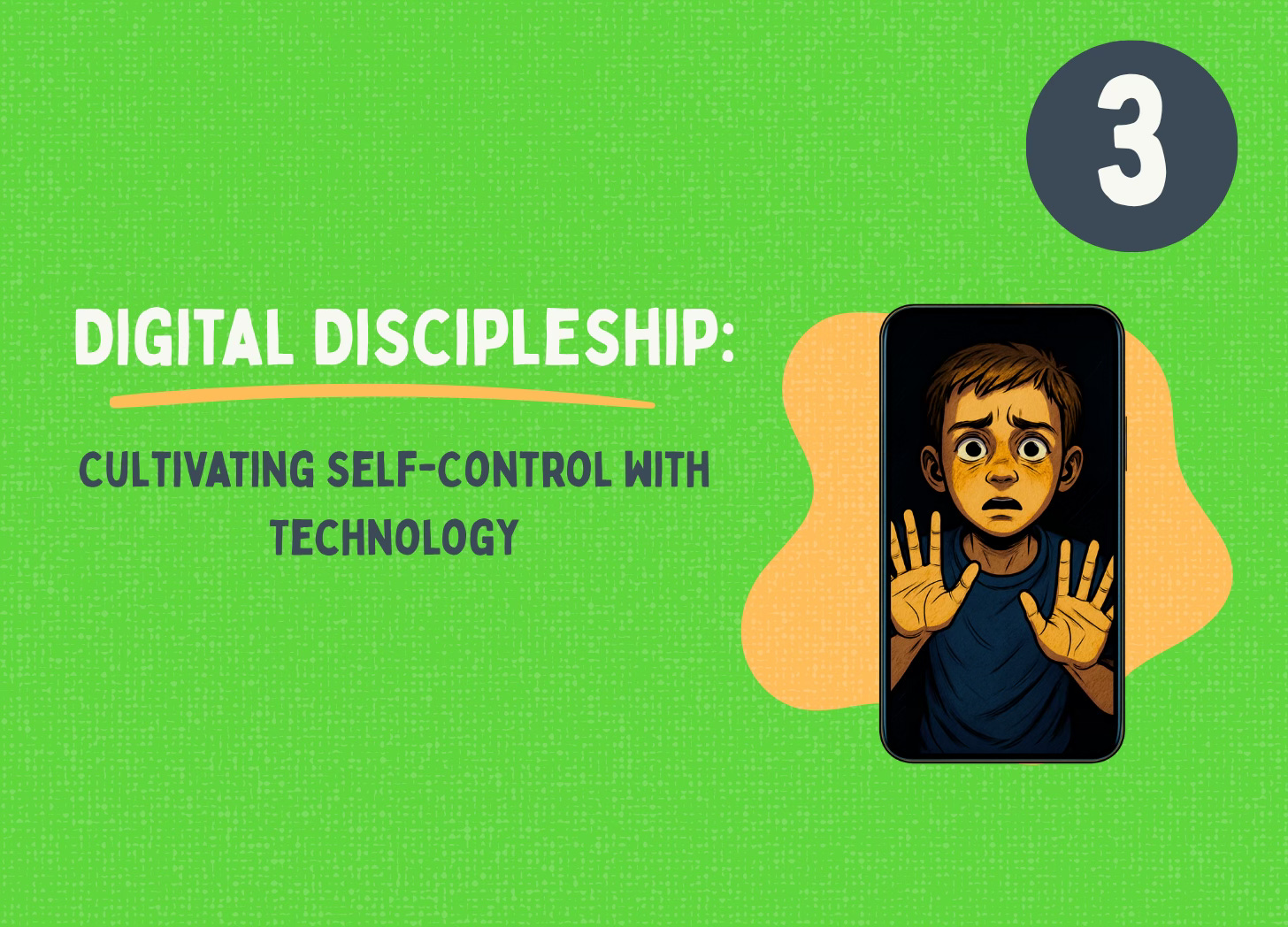Cultivating Self-Control and Responsibility with Technology
Part of our Digital Discipleship Series
In the last few weeks, I have said a lot about screens and the digital world. Last week we talked about the importance of teaching our children discernment when interacting with what I called cultural artifacts such as movies, video games, and social media. In today’s post, I want to talk about an area that has been a constant struggle in my life as a believer: the area of self-control.
Self-control is listed as part of the fruit of the Spirit in Galatians 5. Peter also mentions it in his second letter when he says:
2 Peter 1:5-7 (ESV):
“For this very reason, make every effort to supplement your faith with virtue, and virtue with knowledge, and knowledge with self-control, and self-control with steadfastness, and steadfastness with godliness, and godliness with brotherly affection, and brotherly affection with love.”
It is clear from both of these passages that self-control is not just incidental in the life of the believer—it is presented as an important virtue of the Christian walk and a mark of spiritual maturity. In Peter’s progression, self-control is a result of faith and not a prerequisite to it. It builds upon the foundations of faith, virtue, and knowledge. This is a reminder that self-control comes as a result of understanding and believing God’s truth.
This passage also reminds us that self-control precedes godliness. In his book Your Future Self Will Thank You, Drew Dyck writes:
“Self-control isn’t just one good character trait, a nice addition to the pantheon of virtues. It’s foundational. Not because it’s more important than the other virtues, but because the others rely on it.” (p. 15)
If as parents we desire our children to grow into godliness, it is imperative that we teach them to grow in self-control.
Screen Time Is a Good Metric of Self-Control
I confess that growing in self-control has been a lifelong struggle in my spiritual walk. I am constantly having to confess a lack of self-control and relying on God’s grace to grow in it. For me, different markers remind me of where I am spiritually: my mood, my energy levels, even the numbers on the scale can reveal much about my heart. Everyone has different struggles, but a tool that seems to be almost universal as an indicator of our lack of self-control is our screen time.
Every Sunday morning, my phone pings me with a notification that tells me how much time I spent on it that week. It’s honestly embarrassing, but it is a helpful reminder that I am addicted to screens.
My kids don’t have smartphones, and they probably won’t until they’re sixteen (for more on the impact of screens and social media on the mental health of teenagers, read Jonathan Haidt’s The Anxious Generation). But my wife and I do have control over how much screen time they have every day. We’re one week into summer break, so we are still finding our sweet spot, but as parents we have the ability, and responsibility, to limit their screen time.
Guided by biblical wisdom, we must model and teach self-control by setting clear and consistent boundaries around screen time and content. This isn’t about punishment, but about training children in the discipline of self-governance.
It is important to remember that self-control is not merely about restriction. It is a fruit of spiritual maturity. Science tells us that the human prefrontal cortex doesn’t fully develop until early adulthood. Our children need our help with limits and decision-making. Restriction can modify behavior, but it cannot change the heart, which is ultimately what we desire.
So how can we help our children grow in this area?
Offer Exciting Alternatives
One of the most helpful things we can do for our kids is to fill their lives with things that are genuinely life-giving instead of just letting screens take over. Let's actively encourage activities that get their bodies moving, their minds thinking, and their hearts engaged. Think playing outside, diving into a great book, getting creative with art, or finding ways to serve others. The point isn't to outlaw fun, but to show them that the most lasting kind of joy usually comes from things that require a little effort and imagination. When we pack their days with rich, meaningful experiences, it naturally leaves less room for that mindless scrolling or gaming.
Help Them See Relationships Matter More Than Entertainment
Let's be honest, screens are often the easy default, but they're almost never the best choice. We need to gently guide our children to understand that being with people is simply more valuable than whatever's happening on a screen. Help them see how much it matters to truly be present with others, whether it's laughing over a board game with a sibling, lending a hand to a parent with chores, or just sitting down and really talking. These real-life connections are far more important than the next YouTube video or Fornite season.
Most importantly, the relationship they need to prioritize most is not horizontal but vertical. Their relationship with God. So we should teach our children to create rhythms that look up before they look around. They can do this by spending time in prayer and by reading Scripture.
It really echoes what Jesus taught, doesn't it? The two most important things are loving God and loving our neighbor (Matthew 22:37–39). Putting relationships first isn't just a nice idea; it's right at the heart of following Jesus and provides the perfect training ground for learning to manage ourselves.
Model Self-Control (This is a Big One!)
Our kids learn so much more from watching what we do than from hearing what we say. If we're talking about self-control but our own lives look like a free-for-all, our words won't carry much weight. So, let them see us putting our phones away during family meals. Let them see us choosing to read a book instead of binge-watching a show. Let them see us intentionally taking a break, maybe a "digital Sabbath," from devices. And hey, don't be afraid to talk about your own struggles with this stuff and how much you need God's grace! Show them that self-control isn't just about following a list of rules; it's about living our whole lives surrendered to Christ. I just declared our dining room a screen-free zone, not because my kids are using screens during dinner, but because I often find myself checking text messages or email when my attention should be on my family.
It’s like that verse in Titus reminds us, God's amazing grace trains us to say no to ungodly desires and live lives that are self-controlled, upright, and devoted to Him right here, right now (Titus 2:11–12).
A Final Thought
Ultimately, self-control isn't just some skill we're trying to hammer into our kids. It's something we pray the Holy Spirit will grow within them. And as we're trying our best to guide them, let's keep reminding ourselves that true self-control doesn't come from sheer willpower alone. It grows from staying connected to Jesus, who showed us perfectly what it looks like to live a life of joyful surrender to His Father.




